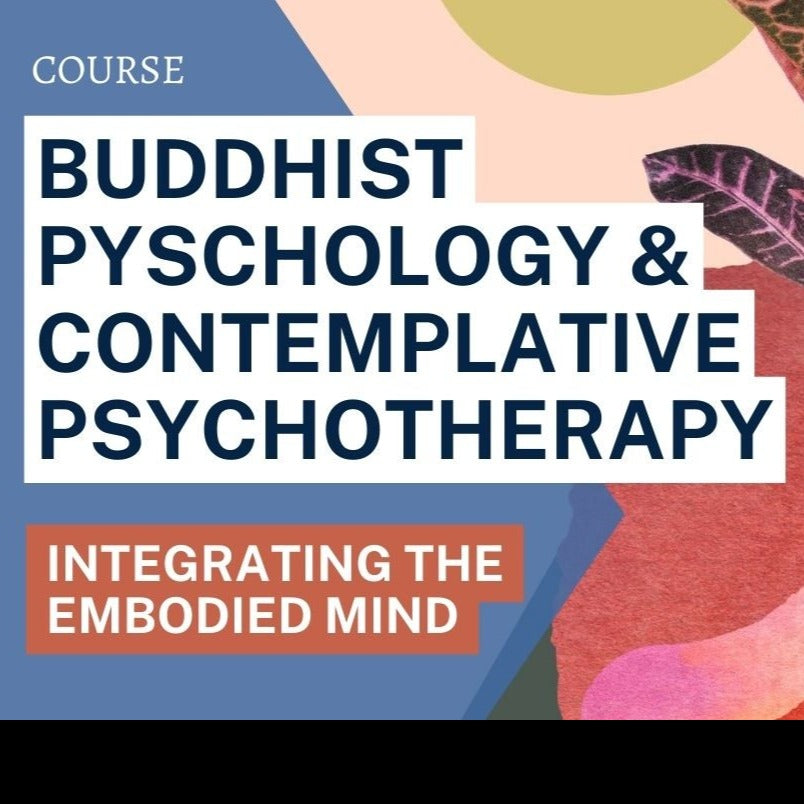Embodied Philosophy
Buddhist Psychology & Contemplative Psychotherapy: Integrating the Embodied Mind
Buddhist Psychology & Contemplative Psychotherapy: Integrating the Embodied Mind
Couldn't load pickup availability
As mindfulness becomes a household word, and its practice is increasingly taken up into pop psychology, medicine and psychotherapy, there is a growing interest among professionals and the public at large in the traditional systems of science, psychology, and healing which are its living source. This course puts the science and practice of mindfulness in the context of Buddhist psychology, and explains how it is most effectively understood and used, not just to “be in the moment” but to help our minds and brains embody the wisdom, awareness, and kindness that can make life freer, healthier, and happier, one moment, one day at a time.
Beyond the psychology of mindful insight and change, the Buddhist tradition developed less known compassion training techniques to help people living busy lives in the world thrive together with others in open-mindedness, warm heartedness, and altruistic engagement. Eventually these techniques were enhanced by embodied contemplative arts like role-modeling imagery, heroic narrative, disarming posture and breathing to expose and transform the normally unconscious depths of the human mind-brain, allowing people to embody the creative leadership powers of heroic vision and flow.
Module 1: Between East and West
Introduces the fast growing dialogue between Buddhist and Western psychology, explaining how and why Buddhist thought and practice are uniquely suited to breaking down centuries old barriers between modern science and spiritual traditions, and presenting the Nalanda tradition (integrating three waves of contemplative science in one continuous stream) as the most modern, scientific, and comprehensive synthesis of the major schools of Buddhist psychology.
Module 2: Personal Self Healing
Explores the basic science of personal self-healing in Buddhist psychology, based on mindfulness, insight, and kindness. The full benefit of this science for turning addiction, anxiety, and depression into inner freedom and lasting happiness is contrasted with the limited and fleeting benefits of pop mindfulness practice. Current neuroscience models of mindfulness and current methods of mindfulness-based therapy are compared with the rigorous understanding and full-bored practice preserved in the Nalanda tradition.
Module 3: Social Healing
Explores the interpersonal science of social healing in Buddhist psychology, based on compassion training, radical openness, and enlightened altruism. Unpacks the full power of this positive science for transforming traumatic emotions, reactive relationships, and social oppression into equanimity, healthy interdependence, and global empathy. Current neuroscience models of empathy and compassion and current methods of compassion-based therapy are compared with the profound wisdom and and expansive practice preserved in the Nalanda tradition.
Module 4: Embodied Healing
Explores the mind/body science of embodied healing in Buddhist psychology, based on heroic vision, transformative flow states, and intuitive openness. It fleshes out the full depth and breadth of this embodied science for transforming buried traumas, reactive instincts, and unconscious narcissism into creative vision, inspired energy, and embodied altruism. Current neuroscience models of imagery and flow and current methods of embodied therapy are compared with the radical mind-brain integration and world-transforming arts preserved in the Nalanda tradition.
Students who take this course will:
- The history and philosophy of Buddhist Psychology.
- The three waves of Buddhist Contemplative practice.
- The latest scientific findings that are changing the conversation between East and West.
- Methods of self-healing that have been transforming lives for thousands of years.
- Skills and strategies to implement in your own personal practice or clinical practice.
- Knowledge and inspiration that will shift your perspective on reality, your relationships and your embodiment.
*Please note, this is a pre-recorded course and may mention old course requirements such as final quizzes and certificates of completion. We no longer offer final quizzes or issue certificates of completion.
Share


